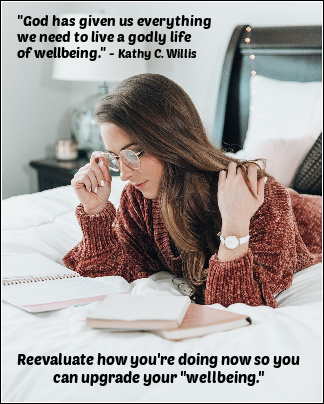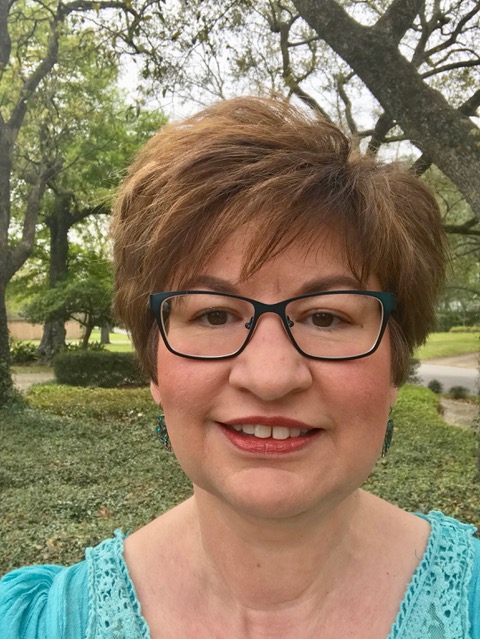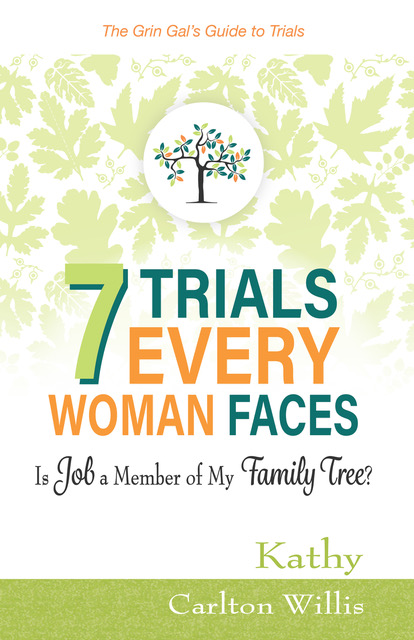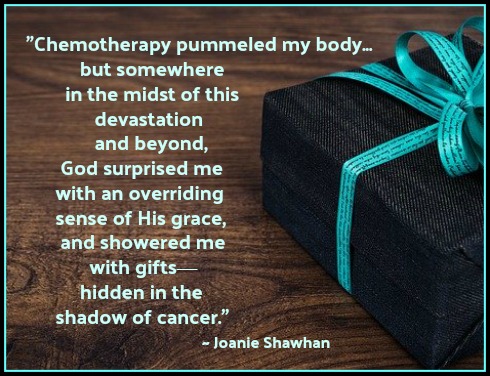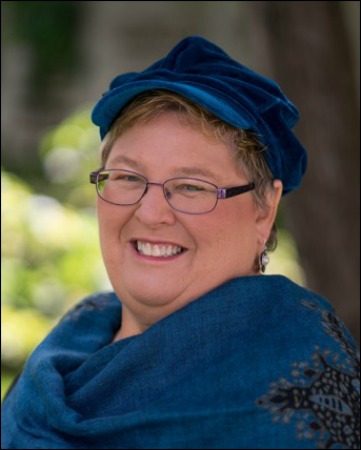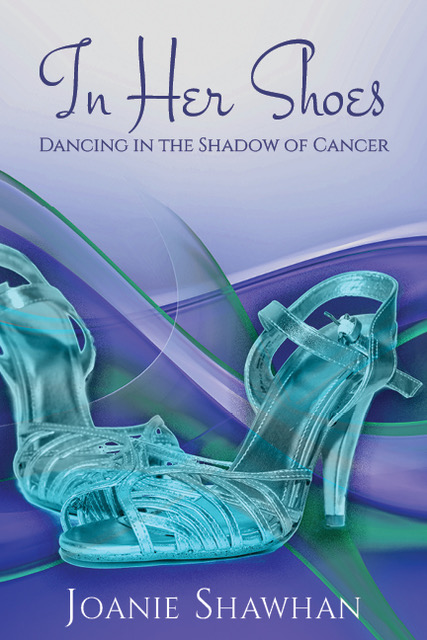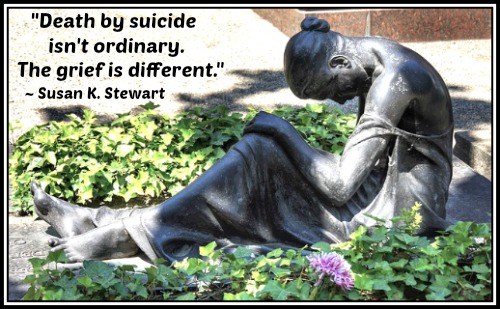COVID Came Calling
Author and caregiver Sally Ferguson has grown in her faith in God since the coronavirus changed so many lives in America. In this Spiritual Life UPGRADE, she tells her story and the scriptures that helped her through a difficult year—scriptures that can help us too.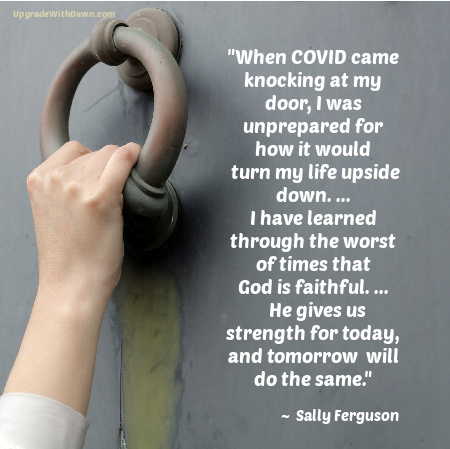
"When COVID came knocking at my door," Sally said, "I was unprepared for how it would turn my life upside down."
I (Dawn) don't think any of us knew how our cirumstances would seem to spiral out of control during the pandemic; but almost everyone I've discussed that with admits God taught us important lessons in our struggles.
We will never be the same; and in some ways, that's a good thing—as Sally explains.
Sally continues . . .
Our family had taken the necessary precautions and followed guidelines for safety. Yet, ten months into the lockdown, not one, not two, but five members of my immediate family tested positive for the coronavirus.
For the most part, I felt I had adjusted to the changes COVID-19 brought to our country and to our county.
I’m an introvert, so I loved being home more, and took online workshops. I made more phone calls to stay connected with my small groups, and checked in with my extrovert friends to see how they were faring.
However, April dawned with attending our daughter’s wedding via Zoom.
- I watched my husband weep at not being able to walk his daughter down the aisle.
- I mourned not being able to assist her preparations.
- The reception in our home state was postponed twice, and then put on hold indefinitely.
In August, elective surgeries were again allowed, and Hubby flew to Florida to help his parents while his dad recuperated from shoulder surgery.
September 8 his mom fell and fractured her back. What followed can only be seen as a bizarre set of events.
The COVID-19 lockdown prohibited visits to her in rehab, where she entered the barren corridors of dementia. She was released only as a shell of her former self.
Hubby came home and I made the trek to Florida to help with her care.
In November, our family packed up my in-laws’ home and moved them north so they could be close by for assistance.
December 21, my father—also in our care—was taken to the hospital with stroke-like symptoms, where he was diagnosed with COVID-19. One week later, my hubby and his dad went to the ER and tested positive.
On January 7, my father-in-law passed away in the hospital.
Why have I shared the events of my COVID-year?
Not because my story is unique. At this time, over 400,000 deaths have occurred in the United States from the coronavirus.
I went into some of the details of our lives because I want to share the most important point.
I have learned through the worst of times that God is faithful.
God never deserts His own.
When I ponder how we will continue to care for my mom-in-love and for my dad, I often wonder how we will keep it up.
But, God.
He gives us strength for today, and tomorrow will do the same.
Now, if I could just tape that to my forehead, it might be a daily reminder. I get into trouble when I try to figure it all out by myself.
What verses would I recommend to a fellow traveler on this road of suffering?
- Isaiah 40:11 — The Lord will hold me close. He will carry me.
- Isaiah 40:27 — God knows. He cares.
- Philippians 1:29 —It is a gift to believe and to suffer. Yes, even in caregiving, because, “If you’ve done it for the least, you’ve done it for Me” (Matthew 25:40).
- Psalm 66:12, 20 — We went through fire, but God has not withheld His love from us.
- Psalm 73:16-17 — I am overwhelmed when I try to understand why COVID hit our family. God grants me perspective, knowing He is still in control.
- Psalm 18:16-19 — Our enemy launched an attack on us, but God is our Rescuer and our support.
- Psalm 22:24 — God does not turn away from suffering.
Have your circumstances brought despair? It may not be COVID-caused, but we can all relate to hardship in this year of change and uncertainty.
Hang on to hope in the God who sees you (Genesis 16:13) and is fighting for you (Deuteronomy 1:29-31).
- May He usher you into His sanctuary for refuge and renewal (Psalm 40:1-3).
- May He take your breath away in awe of His power over the things that leave you feeling powerless (2 Corinthians 12:9).
- And, may you stand confident in knowing you are never alone (Hebrews 13:5).
How will you seek the Lord’s comfort in your turmoil? Will suffering draw you closer to God, or will it put a wedge between you? How will that define your response to Romans 8:35-39?
Sally Ferguson is a caregiver for her mom-in-love, her dad, and her grands, and writing a Bible study for caregivers. She lives in western New York with her hubby of 33 years. Look for her words at EzineArticles, AlmostAnAuthor, Upgrade with Dawn, Amazon and sallyferguson.net.
Graphic adapted, created by Wirestock, courtesy of www.Freepik.com.
 Post a Comment → Posted on
Post a Comment → Posted on  Wednesday, February 10, 2021 at 9:44AM
Wednesday, February 10, 2021 at 9:44AM  COVID,
COVID,  Caregiving,
Caregiving,  Circumstances,
Circumstances,  Coronavirus,
Coronavirus,  Covid-19,
Covid-19,  God is Faithful,
God is Faithful,  Hope,
Hope,  Pandemic,
Pandemic,  Power of God,
Power of God,  Suffering,
Suffering,  Uncertainty,
Uncertainty,  testing positive Upgrade Your Life
testing positive Upgrade Your Life  Faith,
Faith,  Health,
Health,  Spiritual Life
Spiritual Life 




